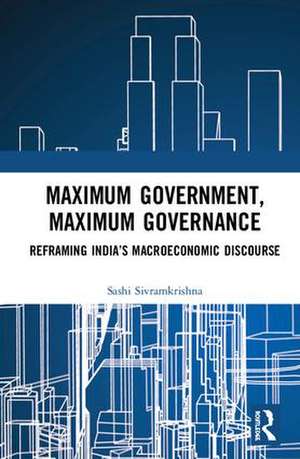Maximum Government, Maximum Governance: Reframing India’s Macroeconomic Discourse
Autor Sashi Sivramkrishnaen Limba Engleză Hardback – 19 feb 2019
Based on an introductory analysis of Modern Money Theory (MMT), this book seeks to present an alternative viewpoint on macroeconomics and macroeconomic policy to address the challenges of economic growth, unemployment and inequality. While adherents of MMT are convinced of its robustness, the challenge is to reframe macroeconomic discourse, which must essentially reject the notion that an economy is financially constrained and instead turn the spotlight on real resource and governance constraints.
Please note: Taylor & Francis does not sell or distribute the Hardback in India, Pakistan, Nepal, Bhutan, Bangladesh and Sri Lanka
| Toate formatele și edițiile | Preț | Express |
|---|---|---|
| Paperback (1) | 256.76 lei 6-8 săpt. | |
| Taylor & Francis – 25 iun 2024 | 256.76 lei 6-8 săpt. | |
| Hardback (2) | 326.11 lei 3-5 săpt. | +21.23 lei 4-10 zile |
| Manohar Publishers and Distributors – 15 sep 2023 | 326.11 lei 3-5 săpt. | +21.23 lei 4-10 zile |
| Taylor & Francis – 19 feb 2019 | 1007.36 lei 6-8 săpt. |
Preț: 1007.36 lei
Preț vechi: 1228.49 lei
-18% Nou
Puncte Express: 1511
Preț estimativ în valută:
192.75€ • 201.27$ • 159.17£
192.75€ • 201.27$ • 159.17£
Carte tipărită la comandă
Livrare economică 15-29 aprilie
Preluare comenzi: 021 569.72.76
Specificații
ISBN-13: 9780367204907
ISBN-10: 0367204908
Pagini: 238
Ilustrații: 23 Halftones, black and white; 2 Tables, black and white
Dimensiuni: 138 x 216 x 14 mm
Greutate: 0.66 kg
Ediția:1
Editura: Taylor & Francis
Colecția Routledge
Locul publicării:Oxford, United Kingdom
ISBN-10: 0367204908
Pagini: 238
Ilustrații: 23 Halftones, black and white; 2 Tables, black and white
Dimensiuni: 138 x 216 x 14 mm
Greutate: 0.66 kg
Ediția:1
Editura: Taylor & Francis
Colecția Routledge
Locul publicării:Oxford, United Kingdom
Public țintă
PostgraduateCuprins
Introduction Part I:Mainstream Macroeconomic Discourse 1. Economics and Macroeconomics 2. The Classical and Keynesian Macroeconomic Paradigms 3. The Neo-Keynesian Paradigm 4. Monetarism and the Decline of Neo Keynesianism 5. The ‘New’ Macroeconomics 6. From Stabilization to Growth and Development 7. A Summary of Neoliberal Macroeconomics Part II:Popular Macroeconomics Discourse in India 8. Putting India’s Current Macroeconomic Policies in Perspective 9. India’s Neoliberal Policy Framework Part III:Modern Money Theory (MMT) 10. Modern Money and Economic Sovereignty 11. Fiscal Deficits in a Modern Money Economy 12. The Hierarchy of Money 13. Banking and Endogenous Money Theory 14. Monetary Policy in the MMT Framework 15. The Sectoral Financial Balances (SFB) Model 16. A Summary of Insights from MMT Part IV:Reframing India’s Macroeconomic Discourse 17. Maximum Government, Maximum Governance
Notă biografică
Sashi Sivramkrishna (Ph.D., Cornell) is presently with Kautilya Entrepreneurship & Management Institute (KEMI) and Foundation to Aid Industrial Recovery (FAIR), Bengaluru.
Descriere
This volume traces the history of macroeconomic schools of thought and explores the origins, essence, shortcomings and deception of mainstream neoliberal macroeconomics.
